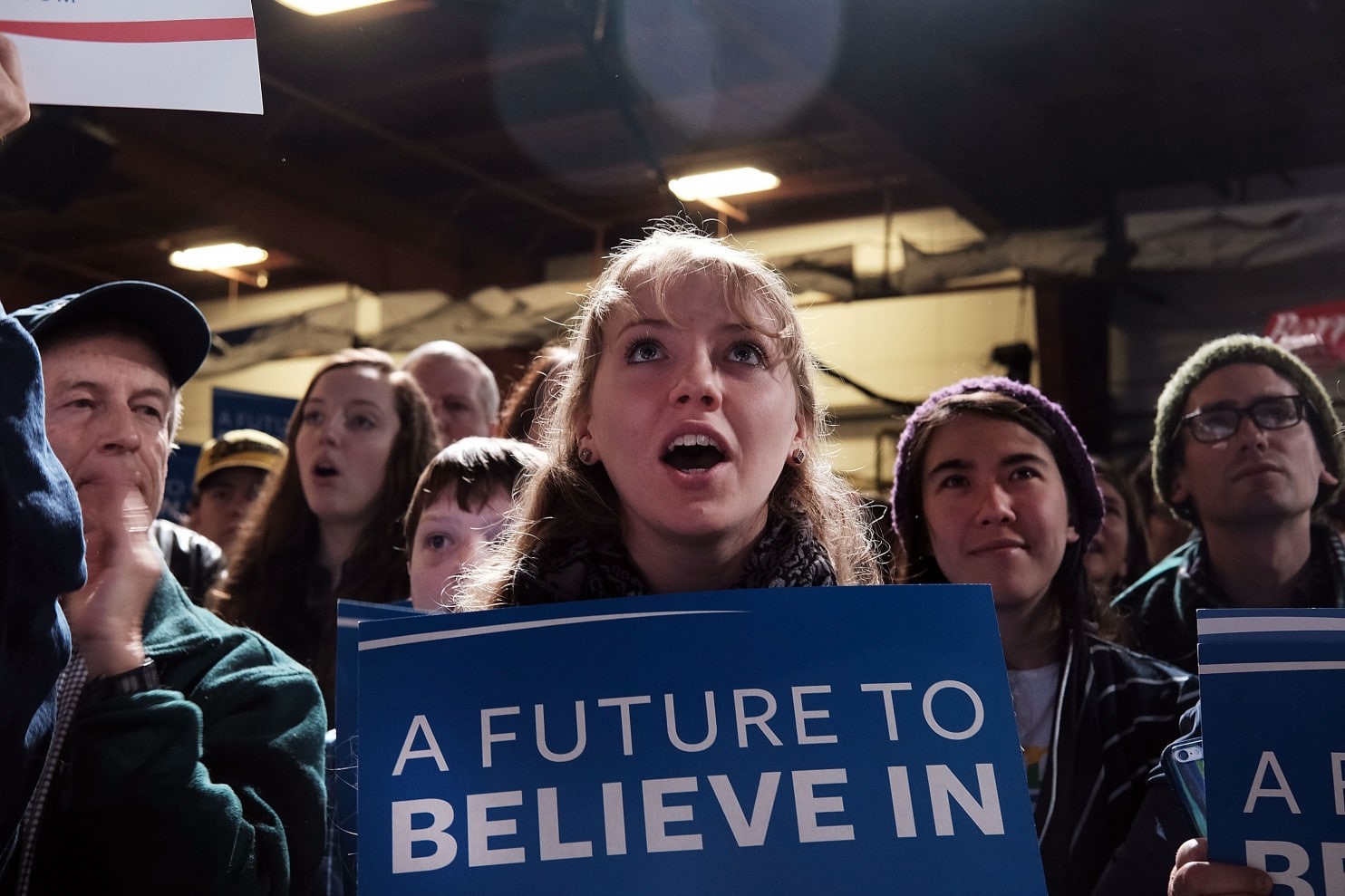By: Emily Ekins – washingtonpost.com – March 24, 2016
Young people like Bernie Sanders, but they like free markets, too.
Each week, In Theory takes on a big idea in the news and explores it from a range of perspectives. This week, we’re talking about the rise of socialism.
Millennials are the only age group in America in which a majority views socialism favorably. A national Reason-Rupe survey found that 53 percent of Americans under 30 have a favorable view of socialism compared with less than a third of those over 30. Moreover, Gallup has found that an astounding 69 percent of millennials say they’d be willing to vote for a “socialist” candidate for president — among their parents’ generation, only a third would do so. Indeed, national polls and exit polls reveal about 70 to 80 percent of young Democrats are casting their ballots for presidential candidate Bernie Sanders, who calls himself a “democratic socialist.”
Yet millennials tend to reject the actual definition of socialism — government ownership of the means of production, or government running businesses. Only 32 percent of millennials favor “an economy managed by the government,” while, similar to older generations, 64 percent prefer a free-market economy. And as millennials age and begin to earn more, their socialistic ideals seem to slip away.
[Our socialist youth: Why millennials are embracing a bad, old term]
So what does socialism actually mean to millennials? Scandinavia. Even though countries such as Denmark aren’t socialist states (as the Danish prime minster has taken great pains to emphasize) and Denmark itself outranks the United States on a number of economic freedom measures such as less business regulation and lower corporate tax rates, young people like that country’s expanded social welfare programs.
Coming of age during the Great Recession, millennials aren’t sure if free markets are sufficient to drive income mobility and thus many are comfortable with government helping to provide for people’s needs. Indeed, a Reason-Rupe study found that 69 percent of millennials favor a government guarantee for health insurance and 54 percent support a guarantee for a college education. Perhaps most striking is that millennials favor a bigger government that provides more services — 52 percent of them do, compared with 38 percent of the nation overall.
So, will it last? Are millennials ushering in a sea change of public opinion? Do they signal the transformation of the United States into a Scandinavian social democracy?
It depends. There is some evidence that this generation’s views on activist government will stick. However, there is more reason to expect that support for their Scandinavian version of socialism may wither as they age, make more money and pay more in taxes.
The expanded social welfare state Sanders thinks the United States should adopt requires everyday people to pay considerably more in taxes. Yet millennials become averse to social welfare spending if they foot the bill. As they reach the threshold of earning $40,000 to $60,000 a year, the majority of millennials come to oppose income redistribution, including raising taxes to increase financial assistance to the poor.
Similarly, a Reason-Rupe poll found that while millennials still on their parents’ health-insurance policies supported the idea of paying higher premiums to help cover the uninsured (57 percent), support flipped among millennials paying for their own health insurance with 59 percent opposed to higher premiums.
When tax rates are not explicit, millennials say they’d prefer larger government offering more services (54 percent) to smaller government offering fewer services (43 percent). However when larger government offering more services is described as requiring high taxes, support flips and 57 percent of millennials opt for smaller government with fewer services and low taxes, while 41 percent prefer large government.
Millennials wouldn’t be the first generation to flip-flop. In the 1980s, the same share (52 percent) of baby boomers also supported bigger government, and so did Generation Xers (53 percent) in the 1990s. Yet, both baby boomers and Gen Xers grew more skeptical of government over time and by about the same magnitude. Today, only 25 percent of boomers and 37 percent of Gen Xers continue to favor larger government.
Many conservatives bemoan millennials’ increased comfort with the idea of “socialism.” But conservatives aren’t recognizing that in the 20th-century battle between free enterprise and socialism, free enterprise already won. In contrast with the 1960s and ’70s, college students today are not debating whether we should adopt the Soviet or Maoist command-and-control regimes that devastated economies and killed millions. Instead, the debate today is about whether the social welfare model in Scandinavia (which is essentially a “beta-test,” because it hasn’t been around long) is sustainable and transferable.
Millennials like free markets, and most already accept that free markets have done more to lift the world out of poverty than any other system. Instead, what this generation has to decide is whether higher education and health-care innovation, access, and high quality can be best achieved through opening these sectors to more free-market reforms or though increased government control. This is a debate we should be glad to have.
To see this article, click read more.
Source: Millennials like socialism — until they get jobs – The Washington Post
 Listen Online
Listen Online Watch Online
Watch Online Find a Station in Your Area
Find a Station in Your Area








 Listen Now
Listen Now Watch Online
Watch Online
